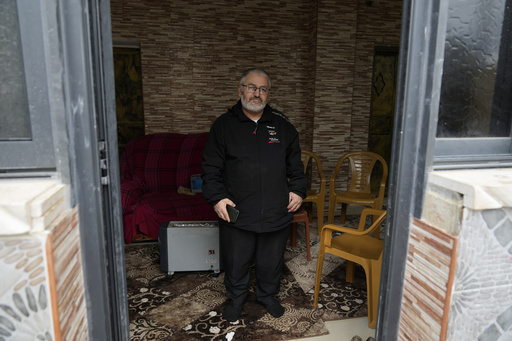
KAFR AL-LABAD, West Bank — The distress call occurred during the night, as Mohammed Shula recounted how his daughter-in-law, eight months pregnant with her first child, reached out to him in fear. Her voice trembled as she pleaded for help, saying, “You have to save us.” Tragically, just moments later, Sondos Shalabi was shot and killed.
Sondos and her spouse, Yazan Shula, who is 26 years old, had fled their home early on Sunday morning as Israeli security forces surrounded the Nur Shams refugee camp in Tulkarem. This military action had escalated as part of a broader offensive targeting Palestinian militants throughout the northern segment of the occupied West Bank. The Israeli Defense Minister, Israel Katz, announced an increase in military operations aimed at preventing Iran, a supporter of Hamas, from establishing a new front in the region.
The shooting of Shalabi, who was only 23, has raised concerns among Palestinians, signifying a troubling shift toward more aggressive military strategies by Israel in the West Bank. Following the incident, the Israeli army released a brief statement, indicating that the incident had been forwarded to military police for further investigation.
On the same day, another young woman, only 21 years old, was killed mere streets away when an explosive device planted by Israeli forces detonated as she approached her home. The Israeli army stated that they had been targeting a wanted gunman within her residence, leading them to breach the door. Officials claimed that despite requests for the woman to exit, she did not respond. The army expressed regret for any unintended harm to innocent civilians.
Statistics from the Palestinian Health Ministry indicate that since the onset of the current conflict following Hamas’ attack on October 7, 2023, at least 905 Palestinians have lost their lives due to Israeli military action. While many casualties included militants engaged in conflict, numerous innocent civilians, including a toddler, a young boy, and an elderly man, have also tragically died in recent weeks.
“The dynamics of combat against the Palestinians have irrevocably changed,” stated Maher Kanan, an emergency responder from the nearby village of Anabta, commenting on what he perceives as a shift in tactics by the Israeli army. “The level of civilian displacement and casualties mirrors the situation that unfolded in Gaza.”
Mohammed Shula, at 58, expressed concerns that since Israeli drones began flying overhead and militants set traps along the roads, his son and daughter-in-law had felt compelled to plan their escape from Nur Shams. With the looming due date for their baby, Shula noted that his son was consistently worried about Shalabi’s safety, fearing that conditions could worsen.
Yazan Shula, who worked in construction, lost his job when the Israeli authorities restricted entry for nearly 200,000 Palestinian workers into Israel. Mohammed described how excited his son was to become a father, and how Shalabi, described as gentle and nurturing, had become like a daughter to him since moving in with the family 18 months prior. “They lived for this baby,” he reflected.
On Sunday morning, the couple hastily packed their belongings, aiming to reach Shalabi’s parents’ home outside the camp, a location considered safer and closer to the hospital where she planned to give birth. Yazan’s younger brother, Bilal, who is 19, joined them for the escape.
Unfortunately, shortly after they left, they were met with gunfire. Mohammed’s phone rang again, and he listened helplessly as Shalabi gasped for breath, recounting how an Israeli sniper had shot Yazan. Though unharmed, Shalabi was terrified, unsure of her next steps. Mohammed attempted to guide her through the ordeal, urging her to seek help by knocking on nearby doors.
“No one came,” he lamented, explaining how he heard her desperate knocks and screams for assistance. Eventually, she reported seeing soldiers approaching, and the call suddenly ended. In despair, he reached out to the Palestinian Red Crescent for assistance.
“I was afraid to go outside; we felt we might be shot too,” recalled 65-year-old neighbor, Suleiman Zuheiri, who was trying to assist medics. “We tried repeatedly, but all in vain. The medics kept being turned away, and the girl continued to bleed.”
Bilal, who was not injured, was arrested at the scene and detained for several hours. The Red Crescent later indicated that they had received authorization from the International Committee of the Red Cross for medics to enter the camp. However, these paramedics faced repeated detentions as they attempted to reach the couple’s vehicle.
When questioned about the obstructions faced by ambulances, the Israeli army reiterated that an investigation was ongoing concerning Shalabi’s death. It wasn’t until after 8 a.m. that emergency medical personnel finally reached the couple, only to be delayed a third time while rushing Yazan to a hospital. Sadly, Shalabi was found deceased at the scene, and their unborn child was also confirmed dead.
In the aftermath, Mohammed Shula struggled to comprehend how soldiers could witness Shalabi’s bloodied body and do nothing, instead taking his other son into custody. “They shot them without cause. They could have intervened; they could have asked a question, but they chose to shoot,” he lamented, his fingers running over a string of prayer beads.
Later in the day, Israeli forces entered the camp, causing explosions and the sounds of armored bulldozers tearing through the streets, damaging infrastructure and disrupting basic services like water and electricity.
As the violence escalated, Israeli troops knocked on Mohammed’s front door ordering his family, including his young grandchildren, to exit their home. The Israeli military refuted claims of forced evacuations, insisting they were merely facilitating voluntary relocations for those wishing to leave the area. However, several civilians expressed that they felt coerced to leave.
Pointing to a bag filled with baby diapers in a friend’s living room, Mohammed Shula reflected on how limited his possessions were when he had to flee, leaving behind cherished keepsakes and clothing.

